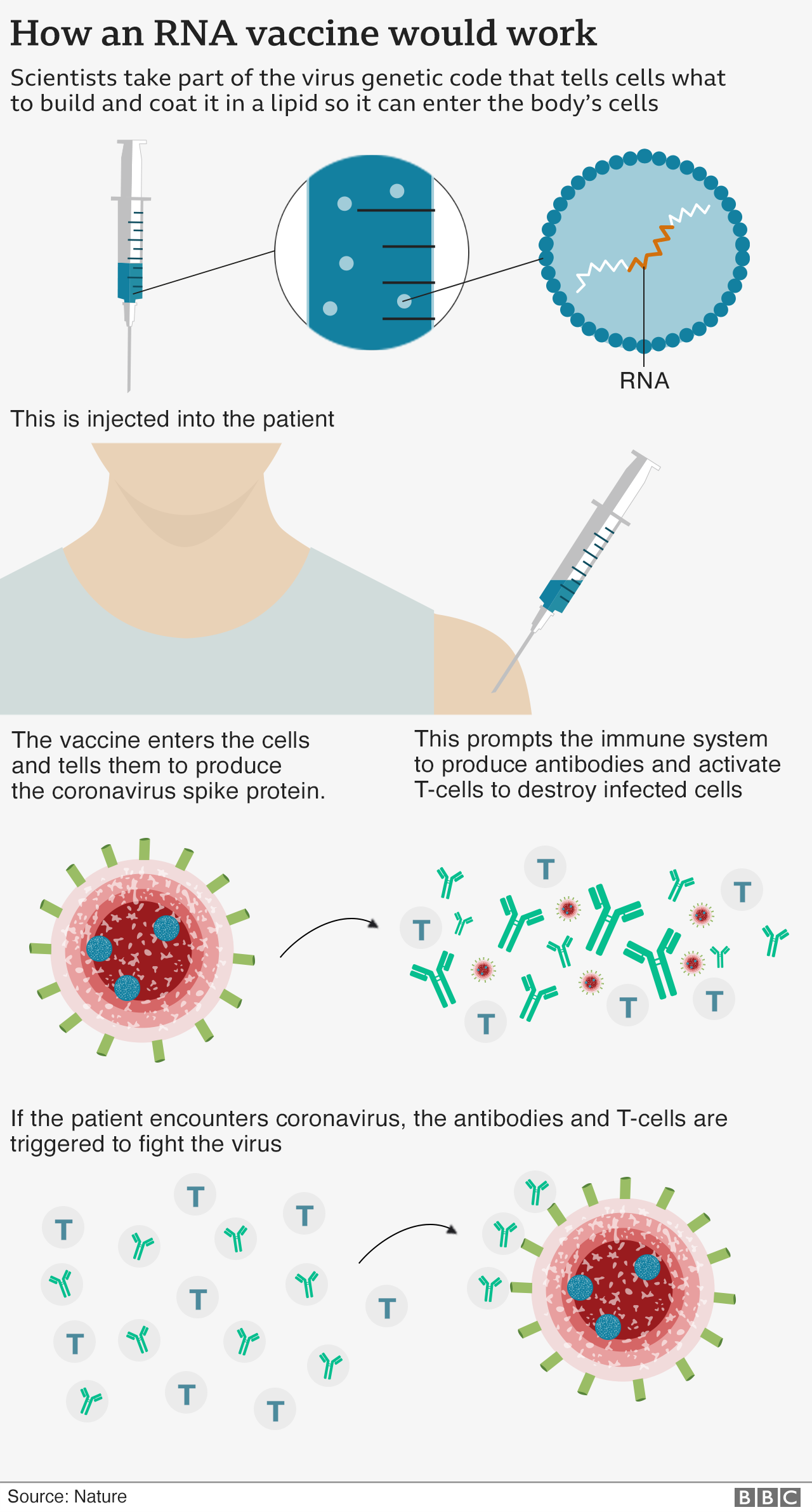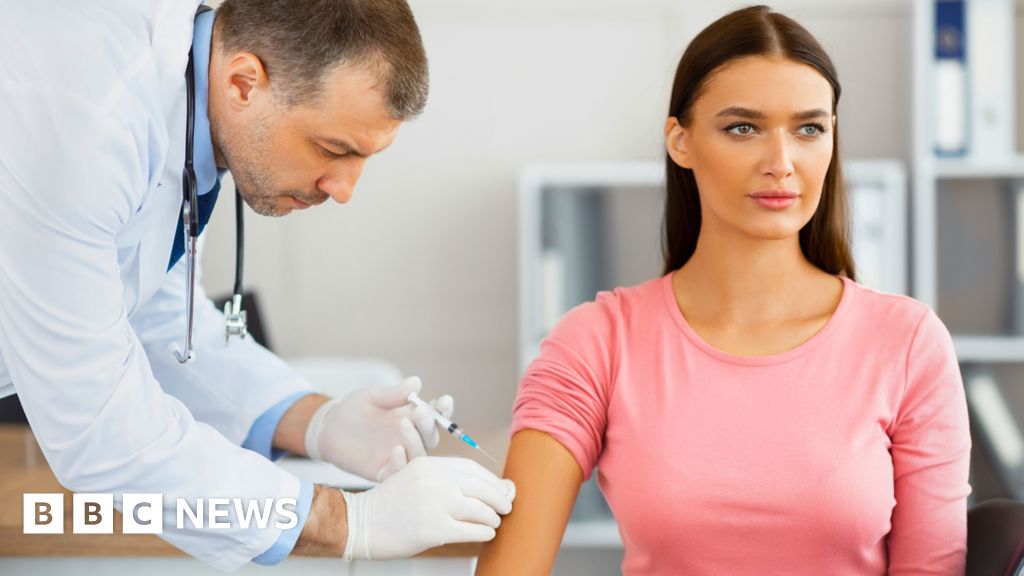By James Gallagher
Health and science correspondent
image copyrightGetty Images
In the past two weeks, both Pfizer and BioNtech and Moderna have announced hugely successful trials of their Covid-19 vaccines.
Others are in development, while a third major trial – from Belgian company Janssen – is under way in the UK.
Why do we need a vaccine?
If you want your life to get back to normal, then we need a vaccine.
Even now, the vast majority of people are still vulnerable to coronavirus infection. It’s only the restrictions on our lives that are preventing more people from dying.
But a vaccine would safely teach our bodies to fight the infection. It would either stop us catching coronavirus in the first place or at least make Covid less deadly.
Having a vaccine, alongside better treatments, is “the” exit strategy.
Which vaccines look most likely to succeed?
Pfizer/BioNtech is the first pharmaceutical company to share information from the final stages of vaccine testing.
The data suggests the jab could prevent more than 90% of people from getting Covid-19.
About 43,000 people have been given the vaccine, and no safety concerns have been raised.
Moderna ran a trial of its vaccine on 30,000 people in the US, in which half were given dummy injections,
It says its vaccine protects 94.5% of people, after only five of the first 95 trial participants who developed Covid symptoms had received the real vaccine.
Trial results are also due in the next few weeks on a vaccine being developed by British drug manufacturer AstraZeneca and scientists at the University of Oxford.
Meanwhile encouraging data on a Russian vaccine called Sputnik V has also been released.
Based on interim results from a phase 3 trial, the same stage reached by the Pfizer jab, Russian researchers report that it is 92% efficient.
What other vaccines are being developed?
More results from other teams working on advanced trials are also expected in the coming weeks and months.
The Janssen trial has started the job of recruiting 6,000 people across the UK. Other countries will join the effort to bring the total up to 30,000.
The company already has one large-scale trial of its vaccine, in which volunteers receive one dose. This work will see if two jabs give stronger and longer-lasting immunity.
Several other vaccines are in the final testing stage, including Wuhan Institute of Biological Products and Sinopharm in China, and Russia’s Gamaleya Research Institute.
However, a trial in Brazil for a drug developed by the Chinese firm Sinovac has been suspended after what was described as a “severe adverse incident” – believed to be a volunteer’s death.
How different are the vaccines under development?
The point of a vaccine is to harmlessly expose parts of the virus to the immune system, which then recognises it as an invader and learns how to fight it.
There are many ways to do this.
Pfizer/BioNtech (and Moderna) have developed what’s known as an RNA vaccine. This uses an experimental approach, which involves injecting part of the virus’s genetic code into the body, to train the immune system.
The Janssen vaccine instead uses a common cold virus that has been genetically modified to make it harmless and to look more like coronavirus at a molecular level. This should train the immune system to recognise and fight coronavirus.
Similarly, the Oxford and Russian vaccines take a harmless virus that infects chimpanzees, and genetically modify it to resemble coronavirus, to try to get a response.
Two of the big China-made vaccines use the original virus but in a disabled form, so it cannot cause an infection.
Understanding which method produces the best results will be vital. Challenge trials, in which people are deliberately infected, could help answer these questions.


When will a vaccine become available?
Pfizer believes it will be able to supply 50 million doses worldwide by the end of this year, and about 1.3 billion by the end of 2021.
The UK should get 10 million doses by the end of 2020, with a further 30 million doses already ordered.
Astra Zeneca/Oxford has agreed to supply 100 million doses of its vaccine to the UK alone and possibly two billion globally – should it prove successful.
Health Minister Matt Hancock said the UK has an “initial agreement” to purchase five million doses of the Moderna vaccine, which will be delivered in the spring.
Who will get the vaccine first?
This depends on where Covid is spreading when the vaccine becomes available and in which groups it is most effective.
Older care home residents and care home staff are top of the UK’s preliminary priority list, followed by health workers like hospital staff, and the over-80s.
Age is, by far, the biggest risk factor for Covid.
What still needs to be done?
- Trials must show the vaccine is safe
- Clinical trials must show vaccines stop people getting sick or at least reduce the number who die
- Hugh-scale development needs to happen for the billions of potential doses
- Regulators must approve the vaccine before it can be given
It is thought that 60-70% of the global population must be immune to stop the virus spreading easily (known as herd immunity) – billions of people, even if the vaccine works perfectly.


What do I need to know about the coronavirus?


Would a vaccine protect everyone?
People respond differently to immunisation.
History suggests any vaccine could be less successful in old people because an aged immune system does not respond as well, as happens with the annual flu jab.
Multiple doses may overcome this, as could giving it alongside a chemical (called an adjuvant) that boosts the immune system.
Follow James on Twitter

